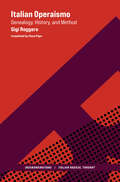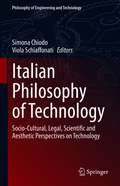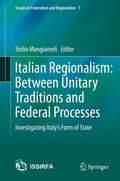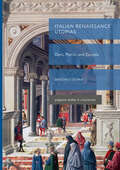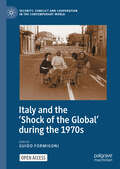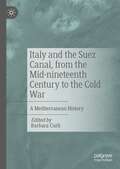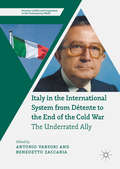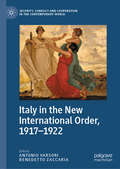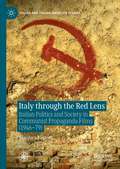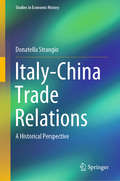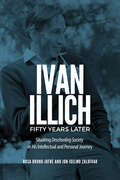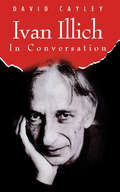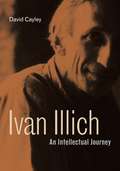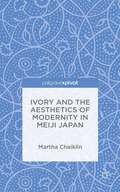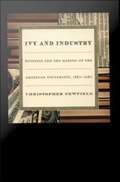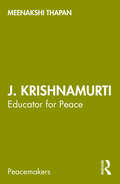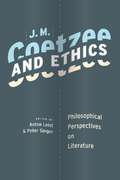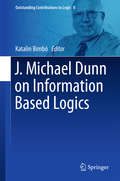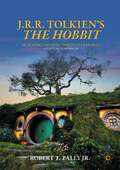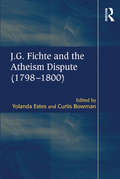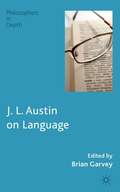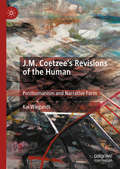- Table View
- List View
Italian Operaismo: Genealogy, History, Method (Insubordinations: Italian Radical Thought)
by Gigi RoggeroAn accessible, introductory presentation of operaismo, one of the most important revolutionary theories and praxes of the twentieth century.&“Operaismo is a Machiavellian return to first principles: it is a return to Marx against Marxism, against its tradition of determinism, historicism, and objectivism. Operaismo isn&’t a heresy within the Marxist family, it is a rupture with that family.&”—extract from Italian Operaismo This accessible, introductory presentation of operaismo (or &“workerism&” in English) arms readers with a deeper understanding of the concepts, context, and history of one of the most important revolutionary theories and praxes of the twentieth century. While the ideas of some of its proponents—above all, Antonio Negri—have circulated widely in the English-speaking world over the past twenty years, rather less is known about the context from which (and against which) these perspectives originally emerged. Gigi Roggero here introduces that broader workerist project, and examines how its various analyses of modern social structures, and the possibility for changing them, related to a potent social movement in Italy during the 1960s and 1970s. Italian Operaismo provides a clear overview of the central moments in that tendency&’s development—from the Italian labor movement&’s crisis of direction in the 1950s, the encounter with the &“new forces&” within the working class at FIAT and elsewhere in the early 1960s, and the political journals Quaderni rossi and Classe operaia, to the experience of Potere Operaio and other organizations a decade later. For readers more familiar with this story, the book provides a rereading of operaismo that is both salutary and provocative, one that stresses above all the role within it of subjectivity and political engagement, demonstrating the continued relevance of its subversive method as a tool for reworking the categories of radical and revolutionary thought. This book will serve as a compact, essential work on how to go about eliminating the gap between theory and practice.
Italian Philosophy of Technology: Socio-Cultural, Legal, Scientific and Aesthetic Perspectives on Technology (Philosophy of Engineering and Technology #35)
by Viola Schiaffonati Simona ChiodoThis is the first volume about the Italian philosophy of technology written in English and including novel and translated contributions. The volume presents original research on emerging topics in the field, as well as an overview of the most distinguished Italian approaches to the philosophy of technology. While offering both historical and political perspectives and the contributions of the philosophy of law, philosophy of science, and aesthetics, Italian Philosophy of Technology promotes a novel view on the intersection between continental and analytic traditions in the philosophy of technology.
Italian Regionalism: Between Unitary Traditions and Federal Processes
by Stelio MangiameliThe object of this book is to describe the institutional modifications of the Italian form of state more than ten years after the review of Title V - Part II of the Italian Constitution - for an audience that goes well beyond the Italian national boundaries. The fifteen essays that make up the book discuss the birth and evolution of the Italian regionalism (including those regions with Special Statutes) as well as reforms of 1999-2001. A particular attention is devoted to the role of autonomy in defining regional statutes, regional forms of government, and regulatory and administrative powers. These are subjects on which there is by now an abundant body of constitutional case law, which is extensively referred to by the chapters. The role of the regions vis-à-vis the local bodies and vis-à-vis the European and international order is also discussed, as the right to negotiate with foreign powers has now been conferred on the regions. Lastly, the volume presents contributions on regional finance and on the new law on fiscal federalism, as well as on regional powers in the area of health and welfare.
Italian Renaissance Utopias: Doni, Patrizi, and Zuccolo (Palgrave Studies in Utopianism)
by Antonio DonatoThis book provides the first English study (comprehensive of introductory essays, translations, and notes) of five prominent Italian Renaissance utopias: Doni’s Wise and Crazy World, Patrizi’s The Happy City, and Zuccolo’s The Republic of Utopia, The Republic of Evandria, and The Happy City. The scholarship on Italian Renaissance utopias is still relatively underdeveloped; there is no English translation of these texts (apart from Campanella’s City of Sun), and our understanding of the distinctive features of this utopian tradition is rather limited. This book therefore fills an important gap in the existing critical literature, providing easier access to these utopian texts, and showing how the study of the utopias of Doni, Patrizi, and Zuccolo can shed crucial light on the scholarly debate about the essential traits of Renaissance utopias.
Italy and the 'Shock of the Global' during the 1970s (Security, Conflict and Cooperation in the Contemporary World)
by Guido FormigoniThis open access book explores how Italy experienced the crucial period of transition that has come to be known as the ‘Shock of the Global’ during the 1970s. This decade marked a change between the prevailing socio-political and economic structures of the post-war world – the ‘golden age’ of national and Fordist capitalism – and a new horizon which would become much more integrated at a global and transnational level. Drawing from a diverse range of sources, the collection focuses on the perceptions of the crisis and the novelties of the globalization process, as well as the complex process of adjustment that occurred as a result, revealing how events during the 1970s impacted Italy’s collective mentality, its social groups, political parties and culture. Comprising 23 brief chapters, each examining a symbolic event of the decade, this book acts as a starting point for studying the Italian perception of international change. An insightful read for anyone researching modern Italian history, globalization or transnational history, this book demonstrates how Italian culture, society and politics reacted to international stimuli from abroad during the 1970s.
Italy and the Suez Canal, from the Mid-nineteenth Century to the Cold War: A Mediterranean History
by Barbara CurliConceived in the 1850s and opened to navigation in 1869, the Suez Canal’s construction coincided with Italy’s path to unification and its first foray into nineteenth-century globalization. Since then, the history of Italy and the Canal have intertwined in many ways, throughout in peace and war. This edited collection explores the fundamental technical, diplomatic and financial contributions that Italy made to the production of the Canal and to its subsequent development, from the mid-nineteenth century to the Cold War. Drawing from unpublished public and private archival sources, this book is the first comprehensive account of this long and multifaceted relationship, providing innovative perspectives on Italy’s diplomatic, economic, social, colonial and cultural history. An insightful read for those studying maritime, diplomatic or Italian history, this book contributes to a growing body of research on the Canal, which has largely emerged from international business, labour and social history, and offers new insights into the Euro-Mediterranean region.
Italy in the International System from Détente to the End of the Cold War
by Benedetto Zaccaria Antonio VarsoriThis edited collection offers a new approach to the study of Italy’s foreign policy from the 1960s to the end of the Cold War, highlighting its complex and sometimes ambiguous goals, due to the intricacies of its internal system and delicate position in the fault line of the East-West and North-South divides. According to received opinion, during the Cold War era Italy was more an object rather than a factor in active foreign policy, limiting itself to paying lip service to the Western alliance and the European integration process, without any pretension to exerting a substantial international influence. Eleven contributions by leading Italian historians reappraise Italy’s international role, addressing three complex and intertwined issues, namely, the country’s political-diplomatic dimension; the economic factors affecting Rome’s international stance; and Italy’s role in new approaches to the international system and the influence of political parties’ cultures in the nation’s foreign policy.
Italy in the New International Order, 1917–1922 (Security, Conflict and Cooperation in the Contemporary World)
by Benedetto Zaccaria Antonio VarsoriThis edited collection offers the first systematic account in English of Italy’s international position from Caporetto – a major turning-point in Italy’s participation in the First World War – to the end of the liberal regime in Italy in 1922. It shows that after the ‘Great War’, not only did Italy establish itself as a regional power but also achieved its post-unification ambition to be recognised, at least from a formal viewpoint, as a great power. This subject is addressed through multiple perspectives, covering Italy’s relations and mutual perceptions vis-à-vis the Allies, the vanquished nations, and the ‘New Europe’. Fourteen contributions by leading historians reappraise Italy’s role in the construction of the post-war international order, drawing on extensive multi-archival and multi-national research, combining for the first time documents from American, Austrian, British, French, German, Italian, Russian and former Yugoslav archives.
Italy through the Red Lens: Italian Politics and Society in Communist Propaganda Films (1946–79) (Italian and Italian American Studies)
by Gianluca FantoniThis book offers the first comprehensive analysis of the role of cinema in the communication strategy of the Italian Communist party (the PCI). It examines the entire period during which the party had a systematic and organized approach to cinematographic production, starting with the early experiments in 1946 and concluding with the closure of PCI film company Unitelefilm at the end of the 1970s. Its analysis sheds light on a range of issues, such as the relationship between the party and Italian intellectuals, the Stalinist imprint of the Italian Communist Party and the historical significance of the Salerno turn, the PCI’s relationship with the student movements in 1968 and 1977, and the PCI’s response to the rise in political violence in the 1970s. Ultimately, the book demonstrates that cinema was essential to the PCI’s propaganda effort.
Italy-China Trade Relations: A Historical Perspective (Studies in Economic History)
by Donatella StrangioThis book examines the political connections and trade relations between Italy and China, with particular emphasis on the second half of the 19th century and the period following the Second World War. In recent years, economic relations between the two countries have intensified as a result of increasing exchange and trade agreements, with positive impacts on their political and diplomatic relations. By studying original public sources such as the Archives of the Italian Ministry of Foreign Affairs, the Bank of Italy and the Central State Archives in Rome, the author offers a historical perspective on the evolution of the two countries’ economic and political ties. The respective chapters address e.g. the role of international governmental authorities, the role of the Italian Bank of China, the impact of trade agreements and foreign investment projects, etc. Given its scope, the book will appeal to scholars of economic history and international economics, as well as political scientists and legal scholars with an interest in international diplomacy and trade agreements.
Iterative Conceptions of Set (Elements in the Philosophy of Mathematics)
by Neil BartonMany philosophers are aware of the paradoxes of set theory (e.g. Russell's paradox). For many people, these were solved by the iterative conception of set which holds that sets are formed in stages by collecting sets available at previous stages. This Element will examine possibilities for articulating this solution. In particular, the author argues that there are different kinds of iterative conception, and it's open which of them (if any) is the best. Along the way, the author hopes to make some of the underlying mathematical and philosophical ideas behind tricky bits of the philosophy of set theory clear for philosophers more widely and make their relationships to some other questions in philosophy perspicuous.
Ivan Illich Fifty Years Later: Situating Deschooling Society in His Intellectual and Personal Journey
by Jon Igelmo Zaldivar Rosa Bruno-JofréIn 1971, priest, theologian, and philosopher Ivan Illich wrote Deschooling Society, a plea to liberate education from schooling and to separate schooling from the state. On the occasion of the fiftieth anniversary of its publication, Ivan Illich Fifty Years Later looks at the theological roots of Illich’s thought and the intellectual and ideological strands that contributed to his ideas. Guided by the central question of how Illich reached the point of writing Deschooling Society, the book sheds light on how Illich produced a critique of schooling that can be defined by its eclecticism. Bruno-Jofré and Igelmo Zaldívar explore how this controversial book was framed by Illich’s early neo-scholastic and anti-modern foundation, his discovery of St. Thomas through Jacques Maritain, and the existential turning points that influenced his public life and intellectual direction in moving from a critique of the Church as institution to a critique of schooling. Drawing from the interpretative theories of Quentin Skinner, Reinhart Koselleck, and William H. Sewell and from concepts such as educationalization, transnationality, and configuration, among other heuristic tools, the authors provide an original and cross-disciplinary analysis of Deschooling Society and its place in Illich’s journey.
Ivan Illich in Conversation: The Testament of Ivan Illich
by David CayleyFor more than fifteen years, iconoclastic thinker Ivan Illich refused to be interviewed. Finally, in 1988, CBC's David Cayley persuaded Illich to record a conversation. This first interview led to additional sessoins that continued until 1992 and are now gathered in Ivan Illich in Conversation. In these fascinating conversations, which range over a wide selection of the celebrated thinker's published work and public career, Illich's brilliant mind alights on topics of great contemporary interest, including education, history, language, politics, and the church.
Ivan Illich: An Intellectual Journey (Ivan Illich #2)
by David CayleyIn the eighteen years since Ivan Illich’s death, David Cayley has been reflecting on the meaning of his friend and teacher’s life and work. Now, in Ivan Illich: An Intellectual Journey, he presents Illich’s body of thought, locating it in its own time and retrieving its relevance for ours.Ivan Illich (1926–2002) was a revolutionary figure in the Roman Catholic Church and in the wider field of cultural criticism that began to take shape in the 1960s. His advocacy of a new, de-clericalized church and his opposition to American missionary programs in Latin America, which he saw as reactionary and imperialist, brought him into conflict with the Vatican and led him to withdraw from direct service to the church in 1969. His institutional critiques of the 1970s, from Deschooling Society to Medical Nemesis, promoted what he called institutional or cultural revolution. The last twenty years of his life were occupied with developing his theory of modernity as an extension of church history. Ranging over every phase of Illich’s career and meditating on each of his books, Cayley finds Illich to be as relevant today as ever and more likely to be understood, now that the many convergent crises he foresaw are in full public view and the church that rejected him is paralyzed in its “folkloric” shell.Not a conventional biography, though attentive to how Illich lived, Cayley’s book is “continuing a conversation” with Illich that will engage anyone who is interested in theology, philosophy, history, and the Catholic Church.
Ivan Illich: An Intellectual Journey (Ivan Illich: 21st-Century Perspectives #2)
by David CayleyIn the eighteen years since Ivan Illich’s death, David Cayley has been reflecting on the meaning of his friend and teacher’s life and work. Now, in Ivan Illich: An Intellectual Journey, he presents Illich’s body of thought, locating it in its own time and retrieving its relevance for ours.Ivan Illich (1926–2002) was a revolutionary figure in the Roman Catholic Church and in the wider field of cultural criticism that began to take shape in the 1960s. His advocacy of a new, de-clericalized church and his opposition to American missionary programs in Latin America, which he saw as reactionary and imperialist, brought him into conflict with the Vatican and led him to withdraw from direct service to the church in 1969. His institutional critiques of the 1970s, from Deschooling Society to Medical Nemesis, promoted what he called institutional or cultural revolution. The last twenty years of his life were occupied with developing his theory of modernity as an extension of church history. Ranging over every phase of Illich’s career and meditating on each of his books, Cayley finds Illich to be as relevant today as ever and more likely to be understood, now that the many convergent crises he foresaw are in full public view and the church that rejected him is paralyzed in its "folkloric" shell.Not a conventional biography, though attentive to how Illich lived, Cayley’s book is "continuing a conversation" with Illich that will engage anyone who is interested in theology, philosophy, history, and the Catholic Church.
Ivory and the Aesthetics of Modernity in Meiji Japan
by Martha ChaiklinThe opening of the ports of Japan in 1859 brought a flood of Japanese craft products to the world marketplace. For ivory it was a golden age. This book examines the role that ivory and ivory carvers played in the expression of nationalism and the development of sculpture in the later nineteenth and early twentieth century.
Ivy and Industry: Business and the Making of the American University, 1880-1980
by Christopher NewfieldEmphasizing how profoundly the American research university has been shaped by business and the humanities alike, Ivy and Industry is a vital contribution to debates about the corporatization of higher education in the United States. Christopher Newfield traces major trends in the intellectual and institutional history of the research university from 1880 to 1980. He pays particular attention to the connections between the changing forms and demands of American business and the cultivation of a university-trained middle class. He contends that by imbuing its staff and students with seemingly opposed ideas--of self-development on the one hand and of an economic system existing prior to and inviolate of their own activity on the other--the university has created a deeply conflicted middle class. Newfield views management as neither inherently good nor bad, but rather as a challenge to and tool for negotiating modern life. In Ivy and Industry he integrates business and managerial philosophies from Taylorism through Tom Peters's "culture of excellence" with the speeches and writings of leading university administrators and federal and state education and science policies. He discusses the financial dependence on industry and government that was established in the university's early years and the equal influence of liberal arts traditions on faculty and administrators. He describes the arrival of a managerial ethos on campus well before World War II, showing how managerial strategies shaped even fields seemingly isolated from commerce, like literary studies. Demonstrating that business and the humanities have each had a far stronger impact on higher education in the United States than is commonly thought, Ivy and Industry is the dramatic story of how universities have approached their dual mission of expanding the mind of the individual while stimulating economic growth.
J. Hillis Miller and the Play of Literature (Routledge Research in American Literature and Culture)
by Jonathan Locke HartThis is the first book to discuss the full sweep of the work of J. Hillis Miller, from his earliest writing in the 1950s to those near the time of his death in February 2021 across the genres of his criticism and theory—poetry, fiction, drama, fiction, non-fiction. The book examines Miller’s preference for close and careful reading of individual literary and critical works over abstract theory. The study will discuss the member of the so-called Yale School of deconstruction to die but will see him as a reader and lover of literature, someone interested in Georges Poulet and phenomenology and in Jacques Derrida and deconstruction. Miller was concerned about many aspects of literature and life, including the pleasure of reading and writing as in climate change, which he saw as the crisis of our time. Miller was well known in humanities and literature worldwide, one of the greatest of modern critics and theorists.
J. Krishnamurti: Educator for Peace (Peacemakers)
by Meenakshi ThapanTeacher, thinker, writer, and speaker, J. Krishnamurti (1895–1986) was an Indian educationist, spiritual leader, and key figure in world philosophy. He raised significant questions about the state of the world, about our tendency to remain passive, conditioned, and in a state of overwhelming confusion about how we relate to the world. Through talks and writings spread over many decades and geographical locations, he articulated an unconditioned, reflective approach which emphasised self-inquiry. This volume provides an understanding of Krishnamurti’s views on the human predicament in a disintegrating world, marked by conflict, divisions, wars, and climate change. It also examines his educational thought and its enormous potential for change. Krishnamurti argued that our minds are so conditioned that we are unable to look, listen, or learn without our prior knowledge that foregrounds the role of memory and time. He highlighted the need to work with young children, with a special focus on the school as the centrepiece of his perception for psychological development and educational excellence. It is within an educational setting that Krishnamurti hoped that the seeds for individual and social change will be catalysed. An introspective look at the life and legacy of an eminent twentieth century thinker, this volume will be of great interest to students and researchers of philosophy, education, religion and spirituality, South Asia studies, modern history, and the social sciences.
J. M. Coetzee and Ethics: Philosophical Perspectives on Literature
by Peter Singer Anton LeistIn 2003, South African writer J. M. Coetzee was awarded the Nobel Prize in Literature for his riveting portrayals of racial repression, sexual politics, the guises of reason, and the hypocrisy of human beings toward animals and nature. Coetzee was credited with being "a scrupulous doubter, ruthless in his criticism of the cruel rationalism and cosmetic morality of western civilization." The film of his novel Disgrace, starring John Malkovich, brought his challenging ideas to a new audience.Anton Leist and Peter Singer have assembled an outstanding group of contributors who probe deeply into Coetzee's extensive and extraordinary corpus. They explore his approach to ethical theory and philosophy and pay particular attention to his representation of the human-animal relationship. They also confront Coetzee's depiction of the elementary conditions of life, the origins of morality, the recognition of value in others, the sexual dynamics between men and women, the normality of suppression, and the possibility of equality in postcolonial society. With its wide-ranging consideration of philosophical issues, especially in relation to fiction, this volume stands alone in its extraordinary exchange of ethical and literary inquiry.
J. Michael Dunn on Information Based Logics
by Katalin BimbóThis book celebrates and expands on J. Michael Dunn's work oninformational interpretations of logic. Dunn, in his Ph. D. thesis (1966),introduced a semantics for first-degree entailments utilizing the idea that asentence can provide positive or negative information about a topic, possiblysupplying both or neither. He later published a related interpretation of thelogic R-mingle, which turned out to be one of the first relational semanticsfor a relevance logic. An incompatibility relation between information stateslends itself to a definition of negation and it has figured into Dunn'scomprehensive investigations into representations of various negations. Theinformational view of semantics is also a prominent theme in Dunn's research onother logics, such as quantum logic and linear logic, and led to theencompassing theory of generalized Galois logics (or "gaggles"). Dunn's latest work addresses informational interpretations of the ternaryaccessibility relation and the very nature of information. The book opens withDunn's autobiography, followed by a list of his publications. It then presentsa series of papers written by respected logicians working on different aspectsof information-based logics. The topics covered include the logic R-mingle,which was introduced by Dunn, and its applications in mathematical reasoning aswell as its importance in obtaining results for other relevance logics. Thereare also interpretations of the accessibility relation in the semantics ofrelevance and other non-classical logics using different notions ofinformation. It also presents a collection of papers that develop semantics forvarious logics, including certain modal and many-valued logics. The publication of thisbook is well timed, since we are living in an "information age. " Providingnew technical findings, intellectual history and careful expositions ofintriguing ideas, it appeals to a wide audience of scholars and researchers.
J. R. R. Tolkien's "The Hobbit": Realizing History Through Fantasy: A Critical Companion (Palgrave Science Fiction and Fantasy: A New Canon)
by Robert T. Tally Jr.This book is a critical introduction to J.R.R. Tolkien’s The Hobbit, but it also advances an argument about the novel in the context of Tolkien’s larger literary and philosophical project. Notwithstanding its canonical place in the fantasy genre, The Hobbit is ultimately a historical novel. It does not refer directly to any “real” historical events, but it both enacts and conceptualizes history in a way that makes it real. Drawing on Marxist literary criticism and narrative theory, this book examines the form and content of Tolkien’s work, demonstrating how the heroic romance is simultaneously employed and subverted by Tolkien in his tale of an unlikely hero, “quite a little fellow in a wide world,” who nonetheless makes history. First-time readers of Tolkien, as well as established scholars and fans, will enjoy this engaging and accessible study of The Hobbit.
J.G. Fichte and the Atheism Dispute (1798–1800)
by Curtis BowmanThe atheism dispute is one of the most important philosophical controversies of late eighteenth and early nineteenth century Germany. Johann Gottlieb Fichte, one of the leading philosophers of the period, was accused of atheism after publishing his essay 'On the Ground of Our Belief in a Divine World-Governance', which he had written in response to Karl Friedrich Forberg's essay 'Development of the Concept of Religion'. Fichte argued that recognition of the moral law includes affirmation of a 'moral world order', which he identified with God. Critics charged both Forberg and Fichte with atheism, thereby prompting Fichte to launch a public campaign of defense that included his threat to resign his position at the University of Jena if he were subjected to any government reprimand. Fichte was forced to make good this threat when his work was censured. The dispute eventually died down but it influenced many other thinkers for years to come. J. G. Fichte: The Atheism Dispute (1798-1800) is the first English commentary devoted solely to the atheism dispute as well as the first English translation of collected writings from the Atheism Dispute. This book brings together many major essays and documents relating to this dispute. These include the anonymous polemic 'A Father's Letter to his Student Son about Fichte's and Forberg's Atheism', Fichte's essays 'Appeal to the Public' and 'Juridical Defense', and numerous documents from the University of Jena and the ducal courts of Dresden, Weimar, and Gotha. Most of the texts are translated from German into English for the first time, and all are accompanied by full commentaries and detailed notes. Bowman and Estes bring to an English speaking audience the full details of this controversy, which ended Fichte's career in Jena and profoundly influenced his approach to communicating philosophical and religious concepts.
J.L. Austin on Language
by Brian GarveyLooking at the work of J. L. Austin, who subjected language to a close and intense analysis, this book deals with his examination of the various things we do with words, and with the philosophical insights he believed could be gained by closely examining the uses of words by non-philosophers.
J.M. Coetzee’s Revisions of the Human: Posthumanism and Narrative Form
by Kai Wiegandt“Kai Wiegandt’s study offers a nuanced, thoroughgoing and deeply engaging account of novelist J.M. Coetzee’s revision of our core ideas of the human—not least the human sense of uniqueness that we have invested in our belief in reason and conviction of God-likeness. He persuasively analyses the careful ways through which Coetzee deploys narrative as a mode of thinking through such human and post-human questions, so developing a fresh and original approach Wiegandt calls ‘anthropological realism’. Drawing on thinkers from across the French, German and Anglophone traditions, Wiegandt has produced a fiercely insightful and committedly interdisciplinary study.” — Elleke Boehmer, Professor of World Literature in English, University of Oxford “J.M. Coetzee’s Revisions of the Human offers a bold and compelling argument that is sure to make a serious intervention in Coetzee criticism. Wiegandt introduces several new fields of enquiry in relation to Coetzee’s fiction; the discussions thus reframe well-worn debates in an innovative way, making for unexpected insights in seemingly familiar critical terrain. The book opens up a valuable and thought-provoking perspective on Coetzee’s work, and will be of particular interest to the philosophically-minded Coetzee specialist.” — Carrol Clarkson, Professor and Chair of Modern English Literature, University of Amsterdam "Tracking skilfully across the shifting terrain of J. M. Coetzee’s fictions, Kai Wiegandt draws out their philosophical and literary intertexts in this lucid, erudite and compelling book, and thereby illuminates a fundamental concern that has persisted throughout Coetzee’s career: to probe and push our ideas of what it is to be human." — Jarad Zimbler, author of J. M. Coetzee and the Politics of Style This study argues that the most consistent concern in Coetzee’s oeuvre is the question of what makes us human. Ideas of the human that stress language use, reason, self-consciousness, autonomy and God-likeness are revised in his novels via a ‘poetic of testing’ which pits intertextually referenced ideas against each other in polyphonic narratives. In addition to examining the philosophical provenance of questions of the human in the work of such thinkers as Plato, Hegel, Heidegger, Barthes and Foucault, the study charts Coetzee’s reconfiguration of elements drawn from major literary precursors like Cervantes, Heinrich von Kleist, Kafka and Beckett. Its leading argument is that Coetzee revises the Enlightenment idea of the human as a disengaged, autonomous thinker by demonstrating the limitations of reason; that he instead offers a view of humanity as engaged agency, a view most compatible with ideas developed in the discourse of post humanism, theories of materiality and social practice theory; and that his revisions depend on narrative form as much as they recommend a narrative approach to ideas in general.
